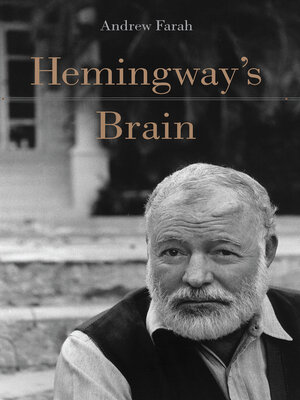
Sign up to save your library
With an OverDrive account, you can save your favorite libraries for at-a-glance information about availability. Find out more about OverDrive accounts.
Find this title in Libby, the library reading app by OverDrive.



Search for a digital library with this title
Title found at these libraries:
| Loading... |
A forensic psychiatrist's second opinion on the conditions that led to Ernest Hemingway's suicide, "mixing biography, literature and medical analysis" (The Washington Post).
Hemingway's Brain is an innovative biography and the first forensic psychiatric examination of Nobel Prize–winning author Ernest Hemingway. After seventeen years researching Hemingway's life and medical history, Andrew Farah, a forensic psychiatrist, has concluded that the writer's diagnoses were incorrect. Contrary to the commonly accepted diagnoses of bipolar disorder and alcoholism, he provides a comprehensive explanation of the medical conditions that led to Hemingway's suicide.
Hemingway received state-of-the-art psychiatric treatment at one of the nation's finest medical institutes, but according to Farah it was for the wrong illness, and his death was not the result of medical mismanagement but medical misunderstanding. Farah argues that despite popular mythology Hemingway was not manic-depressive and his alcohol abuse and characteristic narcissism were simply pieces of a much larger puzzle. Through a thorough examination of biographies, letters, memoirs of friends and family, and even Hemingway's FBI file, combined with recent insights on the effects of trauma on the brain, Farah pieces together this compelling alternative narrative of Hemingway's illness, one missing from the scholarship for too long.
Though Hemingway's life has been researched extensively and many biographies written, those authors relied on the original diagnoses and turned to psychoanalysis and conjecture regarding Hemingway's mental state. Farah has sought to understand why Hemingway's decline accelerated after two courses of electroconvulsive therapy, and in this volume explains which current options might benefit a similar patient today. Hemingway's Brain provides a full and accurate accounting of this psychiatric diagnosis by exploring the genetic influences, traumatic brain injuries, and neurological and psychological forces that resulted in what many have described as his tortured final years. It aims to eliminate the confusion and define for all future scholarship the specifics of the mental illnesses that shaped legendary literary works and destroyed the life of a master.
Hemingway's Brain is an innovative biography and the first forensic psychiatric examination of Nobel Prize–winning author Ernest Hemingway. After seventeen years researching Hemingway's life and medical history, Andrew Farah, a forensic psychiatrist, has concluded that the writer's diagnoses were incorrect. Contrary to the commonly accepted diagnoses of bipolar disorder and alcoholism, he provides a comprehensive explanation of the medical conditions that led to Hemingway's suicide.
Hemingway received state-of-the-art psychiatric treatment at one of the nation's finest medical institutes, but according to Farah it was for the wrong illness, and his death was not the result of medical mismanagement but medical misunderstanding. Farah argues that despite popular mythology Hemingway was not manic-depressive and his alcohol abuse and characteristic narcissism were simply pieces of a much larger puzzle. Through a thorough examination of biographies, letters, memoirs of friends and family, and even Hemingway's FBI file, combined with recent insights on the effects of trauma on the brain, Farah pieces together this compelling alternative narrative of Hemingway's illness, one missing from the scholarship for too long.
Though Hemingway's life has been researched extensively and many biographies written, those authors relied on the original diagnoses and turned to psychoanalysis and conjecture regarding Hemingway's mental state. Farah has sought to understand why Hemingway's decline accelerated after two courses of electroconvulsive therapy, and in this volume explains which current options might benefit a similar patient today. Hemingway's Brain provides a full and accurate accounting of this psychiatric diagnosis by exploring the genetic influences, traumatic brain injuries, and neurological and psychological forces that resulted in what many have described as his tortured final years. It aims to eliminate the confusion and define for all future scholarship the specifics of the mental illnesses that shaped legendary literary works and destroyed the life of a master.






